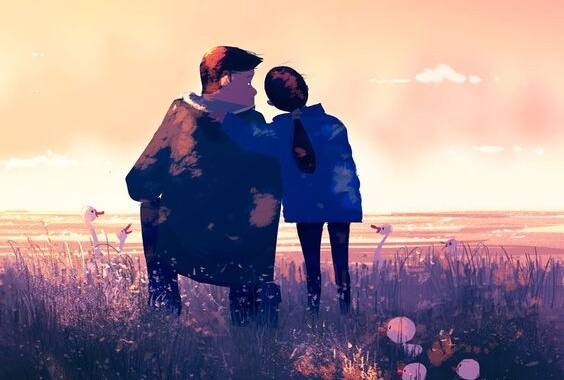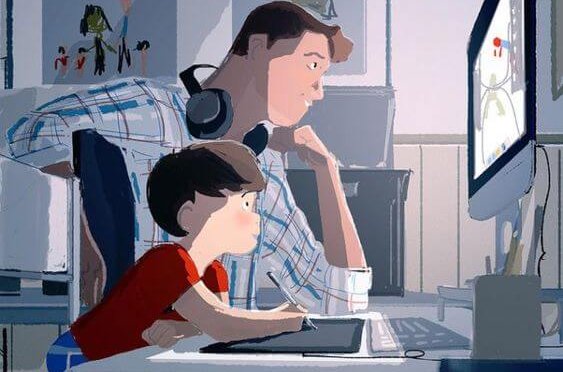My Dad Is My Hero and Role Model


Written and verified by the psychologist Valeria Sabater
Sigmund Freud said that few things are as valuable during childhood as the feeling of security given to us by our parents. Parents take responsibility for their roles, rise up to the challenge of being our true heroes and role models who we always tend to look up to.
We know this website is mainly dedicated to moms. We aim to give strategies and advice to women dealing with pregnancy, breastfeeding or the important task of raising and educating their children.
With that being said, fathers are also an important presence in their child’s life, and today we are even seeing a phenomenon that we like and feel excited about. Fathers are advocating for themselves across many mediums, scenarios and organizations, and defending their role as a father who is conscious, constant and affectionate.
So much so, that this movement has already been named: they are the “neo-fathers”, those men of various ages who already attend respectful child rearing workshops, who want to challenge stereotypes and cliches, and who are as informed as mothers in almost any topic related to children and childhood.
These are dads who stand out as true role models – who inspire us, and who, without doubt, will forever mark the lives of their children.
My Father, My Hero, My Role Model

We all have our own parents in mind. They are our roots. They left their imprint in the depths of our being, our roots and our identity. This person has such a deep effect on us, that we cannot ignore the fact that things like dealing with the absence of a father or experiencing, for example, an upbringing with indifference or a lack of warmth and affections at its foundations, causes us to have many gaps, some traumas and several psychological complexes, enough to fill a book.
However, if we have had the privilege of having a close, significant and affectionate father figure, we will certainly have a real treasure in life, a role model in our day-to-day life, and someone to emulate through their advice, the way they treat others, and their mannerisms… Because a good father is an inspiration and is the guiding force of many families, just as mothers are.
The Contributions of a Good Father
A good father contributes just as much as a good mother. They are two pillars, two trees that foster our strengths, that protect us with their branches and that guide us to reach our dreams, desires and possibilities.
- Above all, a good father serves as a behavior model for their child. Little ones are very receptive to what their fathers tell them, about what they should do or not do. This is why it is imperative that parents are very conscious of everything they do or express aloud. Our children are very receptive to any stimulus, behavior, attitude…
- A good father helps us to make decisions, especially those that are based on values, rules and those acts of mindfulness and maturity that fathers teach us every day.
- A good father also encourages curiosity in his children and helps them to solve their problems by always being receptive.
- For their part, good fathers are commonly the refuge that children always seek when some difficulty arises. They know that their dad is the person who can quell any fear, and who can’t say “no.” He is the hero who checks under the bed for us, who distracts us when there are thunder and storms, and who makes us laugh when we have had a bad day…
A dad is not just a big kid. A dad is a person who helps us grow

Our everyday language, which is sometimes filled with inaccurate ideas, empty phrases and clichés, has caused some damage to the figure of the father over time. So, phrases like “My partner helps me with my kids” or “my husband is just like a big kid because my kids have a great time with him” are ideas that we should approach in a better way.
- A father doesn’t help with parenting, he is a part of it.
- A dad is not there exclusively to play with his children, to amuse them, or entertain them when their mother is not there or is busy.
- A father will play with his children when it is time for that, but above all, what he is doing is educating them, attending to their needs, nurturing them emotionally, staying close by, establishing limits when needed, and being the wise and responsible father for whom the act of parenting is conscious, responsible and mature.
Let us learn to be more careful with our language, to put integrative efforts into practice where mothers and fathers each take half of the responsibilities, where there are no differences or preferences, and where children are always the most important thing. We can all be heroes in our children’s lives…
All cited sources were thoroughly reviewed by our team to ensure their quality, reliability, currency, and validity. The bibliography of this article was considered reliable and of academic or scientific accuracy.
- Bowlby, J. (1986). Vínculos afectivos: formación, desarrollo y pérdida. Madrid: Morata.
- Bowlby, J. (1995). Teoría del apego. Lebovici, Weil-HalpernF.
- Garrido-Rojas, L. (2006). Apego, emoción y regulación emocional. Implicaciones para la salud. Revista latinoamericana de psicología, 38(3), 493-507. https://www.redalyc.org/pdf/805/80538304.pdf
- Marrone, M., Diamond, N., Juri, L., & Bleichmar, H. (2001). La teoría del apego: un enfoque actual. Madrid: Psimática.
- Moneta, M. (2003). El Apego. Aspectos clínicos y psicobiológicos de la díada madre-hijo. Santiago: Cuatro Vientos.
This text is provided for informational purposes only and does not replace consultation with a professional. If in doubt, consult your specialist.
